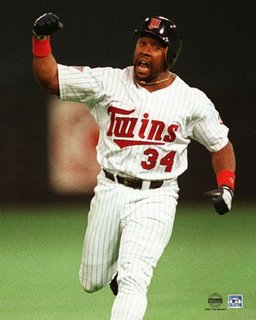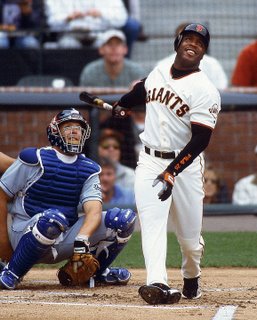Don't Let Me See That Other Side of You
Congrats to Mr. Ben Grant for correctly naming "Heavy Things" by Phish as the Wednesday Song of the Day. If there was going to be anyone who reads this blog that I could count on to identify Phish lyrics it would be Ben, unless you really are out there Trey.
This Op-Ed piece in today's New York Times seems to identify a curious standard that exists in the way that flawed sports figures are viewed in our society. Like each of us, Barry Bonds and Kirby Puckett have had their shortcomings in life. Unlike the vast majority of us, their mistakes and flaws are exposed over a broad area due to their position as professional athletes in what is undoubtedly the historic American game, baseball.
After Puckett's death this week and the release of an excerpt from a book detailing Bonds' struggles with allegations over his now apparent use of performance-enhancing steroids, both players are back in the spotlight and their juxtaposition in our consciousness is interesting due to the way that we view their respective failings.

Puckett was always one of the most loved players of his generation. After leading the Twins to two World Series titles in his 12-career and forever etching his name in baseball history with his performance in Game 6 of the 1991 World Series, Puckett was assured as a player that would be well-remembered not only in Minnesota, but in the baseball world at large. His everyman nature was enhanced by the fact that he did not have an Olympian body, but instead looked as though he might have been the offspring of a pair of athletically-gifted bowling balls.
After his career, Puckett faced several trials. Some of these trials such as glaucoma, which forced him to retire early, were out of his ability to control, but others were purely self-inflicted wounds. Even after revelations of domestic abuse and infidelity, Puckett did not lose all of the luster that he had built up during his glory years with the Twins.
 On the other hand, Barry Bonds is demonized by many who follow baseball. The son of a major-leaguer, Bonds has carried tremendous expectations for himself since the day he entered the majors out of Arizona State. From his early days as a rail-thin outfielder for the Pittsburgh Pirates to his current ascent up the career homerun charts, Bonds has consistently performed at a high level, but at what cost?
On the other hand, Barry Bonds is demonized by many who follow baseball. The son of a major-leaguer, Bonds has carried tremendous expectations for himself since the day he entered the majors out of Arizona State. From his early days as a rail-thin outfielder for the Pittsburgh Pirates to his current ascent up the career homerun charts, Bonds has consistently performed at a high level, but at what cost?Due to rampant allegations that seem to have been confirmed with the release of this latest book, Bonds seems to have finally cemented his place in the baseball mythology as a villain whose desire to succeed overrode his sense of fair play and integrity within the game.
In America, we seem ready to forgive those athletes who have personal shortcomings after the roar of the crowd has been silenced, but we have a very difficult time justifying allegiance to those who we believe have damaged the internal structures and mores of the games that we probably care too much about.
Kirby's time has come and gone, but Barry still has a chance to begin to make things right, not only with those that he has played with, but the baseball community as a whole. Will he ever take the time to admit that his desire to perform at a superhuman level drove him to compromise one of the foundational principles of the game? Probably not, but it might be a good place to start.


1 Comments:
"Either Way" by Guster
TKPecinovsky
Post a Comment
<< Home